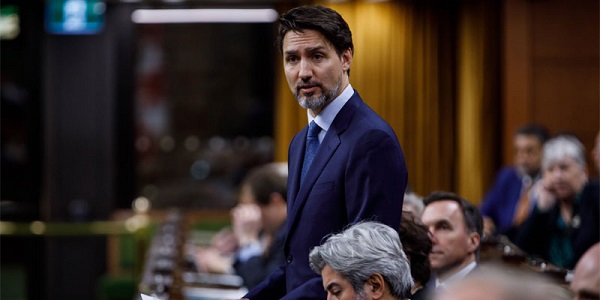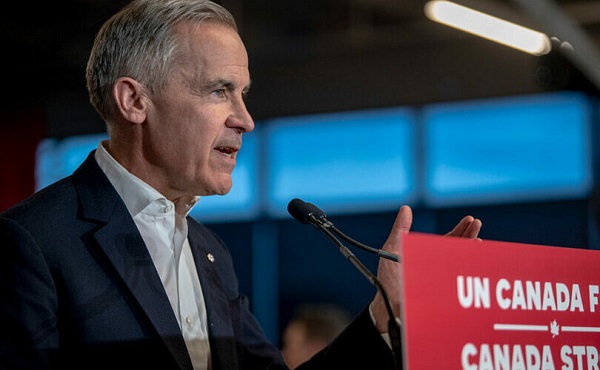Business
Trudeau’s new tax package gets almost everything wrong

From the Fraser Institute
Recently, Prime Minister Justin Trudeau announced several short-term initiatives related to tax policy. Most notably, the package includes a two-month GST holiday on certain items and a one-time $250 cheque that will be sent to all Canadians with incomes under $150,000.
Unfortunately, the Trudeau government’s package is a grab bag of bad ideas that will not do anything to get Canada out of the long-term growth rut in which our economy is mired. There are too many to list all in one place, but here are four of the biggest problems with Prime Minister Trudeau’s tax plan.
- It reduces the wrong taxes. When it comes to economic growth, not all taxes are created equal. Some cause far more economic harm per dollar of government revenue raised than others. The government’s package creates a holiday on the GST for some items (only for two months) which is a mistake given that the GST is one of the least economically harmful components of the tax mix. Canada’s recent growth record is abysmal, and boosting growth should be a primary goal of any changes to tax policy. A GST cut of any duration fails this test relative to other tax cuts.
- Temporary tax holidays shift consumption in time, they don’t boost growth. The government’s GST reduction is actually a short-term tax holiday on certain items that will last two months. There are decades worth of economic research showing that when governments create short-term tax breaks, they may change the timing of consumption, but they won’t contribute to actual economic growth. Shifting consumption from the future to the present won’t help get Canada out of the economic doldrums. This is particularly true of the Trudeau tax holiday since purchases that Canadians may have made after the two-month holiday period will simply be shifted forward to take advantage of the absence of the GST. As noted above, there are better taxes to cut than the GST, but no matter what taxes we are talking about permanent reductions are vastly superior to temporary tax cuts like short-term holidays.
- One-time tax rebates don’t improve economic incentives. Perhaps the worst element of the Trudeau government’s announcement was a plan to send $250 cheques to all Canadians earning under $150,000. One-time tax rebates are a terrible way to provide tax relief. When you cut income tax rates, you improve incentives for people to work and invest because they get to keep a larger share of their earnings. This helps the economy grow. One-time rebates that you get regardless of the economic choices you make has no similar effect. This means that the rebate with its $4.7 billion price tag won’t help Canada’s poor growth performance.
- It borrows from the future to give to the present. The federal government is currently running a large deficit. This raises the question of who will have to pay the $4.7 billion bill for the one-time payments announced today. The answer is that the government will have to borrow the money and therefore future taxpayers will have to either pay it off or service the extra debt indefinitely. The money the Trudeau government will send out won’t come out of thin air, it’ll have to be borrowed with the burden falling on future taxpayers.
The Trudeau government got one thing conceptually right, which is that there are advantages to reducing the tax burden on Canadians. Unfortunately, the policy package it has put forward to provide tax relief gets everything wrong. It reduces the wrong taxes, shifts taxes temporally rather than cutting them, does nothing to improve economic incentives, and burdens future taxpayers. With the holiday season around the corner, this attempt at a gift to Canadian taxpayers is the economic equivalent of a lump of coal in the stocking.
Authors:
Business
Musk Slashes DOGE Savings Forecast By 85%


From the Daily Caller News Foundation
By Thomas English
Elon Musk announced Thursday that the Department of Government Efficiency (DOGE) is now targeting $150 billion in federal savings for fiscal year 2026 — dramatically scaling back earlier claims of slashing as much as $2 trillion.
Musk initially projected DOGE would deliver $2 trillion in savings by targeting government waste, fraud and abuse. That figure was halved to $1 trillion earlier this year, but Musk walked it back again at Thursday’s Cabinet meeting, saying the revised $150 billion projection will “result in better services for the American people” and ensure federal spending “in a way that is sensible and fair and good.”
“I’m excited to announce we anticipate saving in FY ’26 from a reduction of waste and fraud a reduction of $150 billion dollars,” Musk said. “And some of it is just absurd, like, people getting unemployment insurance who haven’t been born yet. I mean, I think anyone can appreciate — I mean, come on, that’s just crazy.”
The announcement marks the latest in a string of revised projections from Musk, who has become the face of President Donald Trump’s aggressive federal efficiency agenda.
“Your people are fantastic,” the president responded. “In fact, hopefully they’ll stay around for the long haul. We’d like to keep as many as we can. They’re great — smart, sharp, finding things that nobody would have thought of.”
Musk originally floated the $2 trillion figure during campaign appearances last fall.
“I think we could do at least $2 trillion,” Musk said at the Madison Square Garden campaign rally in November. “At the end of the day, you’re being taxed — all government spending is taxation … Your money is being wasted, and the Department of Government Efficiency is going to fix that.”
By January, he softened expectations to a “really quite achievable” $1 trillion target before downsizing that figure again this week.
“Our goal is to reduce the deficit by a trillion dollars,” Musk told Fox News’ Bret Baier “Looked at in total federal spending, to drop the federal spending from $7 trillion to $6 trillion by eliminating waste, fraud and abuse … Which seems really quite achievable.”
DOGE’s website, which tracks cost-saving initiatives and contract cancellations, currently calculates total federal savings at $150 billion.
2025 Federal Election
Taxpayers urge federal party leaders to drop home sale reporting to CRA

Party leaders must clarify position on home equity tax
The Canadian Taxpayers Federation is calling on all party leaders to prove they’re against home equity taxes by pledging to immediately remove the Canada Revenue Agency reporting requirement on the sale of primary residences.
“Canadians rely on the sale of their homes to pay for their golden years,” said Carson Binda, CTF B.C. Director. “After the government spent hundreds of thousands of dollars flirting with home taxes, taxpayers need party leaders to prove they won’t tax our homes by removing the CRA reporting requirement.”
Right now, the profit you make from selling your home is exempt from the capital gains tax. However, in 2016, the federal government mandated that Canadians report the sale of their homes to the CRA, even though it’s tax exempt.
The Canada Mortgage and Housing Corporation also spent at least $450,000 to study and influence public opinion in favour of home equity taxes. The report recommended a home equity tax targeting the “housing wealth windfalls gained by many homeowners while they sleep and watch TV.”
“A home equity tax would hurt seniors saving for their golden years and make homes more expensive for younger generations,” Binda said. “If the federal government isn’t planning on imposing a home equity tax, then Canadians shouldn’t be forced to report the sale of their home to the CRA.”
-

 2025 Federal Election2 days ago
2025 Federal Election2 days agoResearchers Link China’s Intelligence and Elite Influence Arms to B.C. Government, Liberal Party, and Trudeau-Appointed Senator
-

 Business1 day ago
Business1 day agoCanadian Police Raid Sophisticated Vancouver Fentanyl Labs, But Insist Millions of Pills Not Destined for U.S.
-

 2025 Federal Election2 days ago
2025 Federal Election2 days agoPoilievre Announces Plan To Cut Taxes By $100,000 Per Home
-

 2025 Federal Election2 days ago
2025 Federal Election2 days agoTwo Canadian police unions endorse Pierre Poilievre for PM
-

 2025 Federal Election16 hours ago
2025 Federal Election16 hours agoTaxpayers urge federal party leaders to drop home sale reporting to CRA
-

 2025 Federal Election2 days ago
2025 Federal Election2 days agoCarney needs to cancel gun ban and buyback
-

 2025 Federal Election20 hours ago
2025 Federal Election20 hours ago‘Sadistic’ Canadian murderer claiming to be woman denied transfer to female prison
-

 2025 Federal Election2 days ago
2025 Federal Election2 days agoMark Carney vows to provide sterilizing puberty blockers to children ‘without exception’







